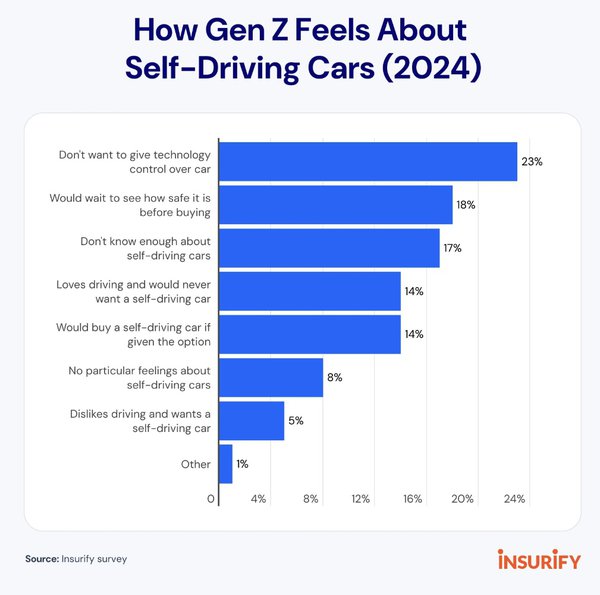
Gen Z consumers are not big on driving -- but also
aren’t interested in self-driving vehicles, according to new research.
More than one in four (26%) of Gen Z consumers do not drive, according to Insurify, which surveyed more than 800 U.S. residents between 22 and 27 years old in May.
Their top reasons why are not having a license (42%), being unable to afford it (28%) and not enjoying it (15%). Nearly
half (49%) don’t drive because they say it’s not a necessity to have a car where they live. Of those that have a vehicle, 12% of Gen Z share one with a
friend, family or partner.
The generation has been slow to get driver’s licenses. Only 60% of 18-year-olds had a license in 2022 compared to 80% in 1983, according to
Department of Transportation data.
advertisement
advertisement
Gen Z is uncertain about autonomous vehicles, with 17% of the Insurify survey respondents claiming they don’t know enough about them and 18%
saying they would need to wait and see how safe the cars were before buying one.
While 19% of Gen Z-ers are excited about self-driving vehicles, most are skeptical and could slow
the transition to fully autonomous cars. Only 5% of Gen Z say they dislike driving so much that they want a self-driving car.
The great promise of autonomous driving
technology is that it will prevent traffic accidents, injuries and fatalities, according to Insurify. These risks typically factor into car insurance rates, along with the cost of repairing or
replacing your car in the event of an accident. Cars with Advanced Driver Assistance Systems cost 37.6% more to repair than cars without ADAS, according to AAA.“[ADAS] technology will become
less expensive as time goes on, impacting premiums heavily in the short term and leveling out once the system has been refined,” says Buddy Parkhurst, a licensed insurance agent with Insurify,
in a release.
Parkhurst thinks the U.S. is “at least a decade away” from mass-market driving technology that’s advanced enough to cause insurers to reconsider
whether autonomous cars or human drivers are responsible for a collision. Regarding current driving tech, “Ultimately, the person in the driver’s seat is going to be responsible for any
accidents resulting from malfunctioning.”